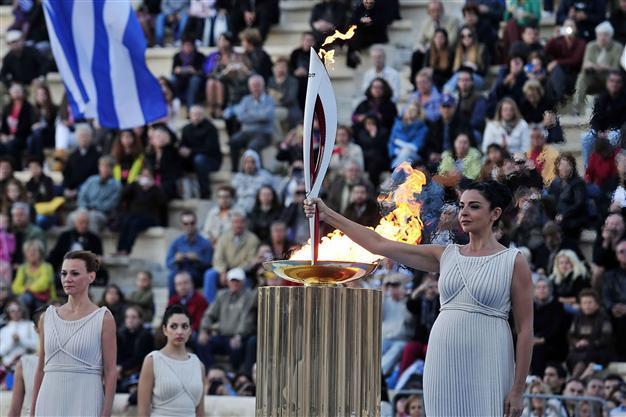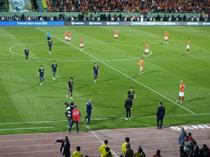Olympic flame arrives in Russia ahead of Sochi Games
MOSCOW - Agence France-Presse

Actress Ino Menegaki (R)plays a high priestess as she holds a torch with the Olympic flame on October 5, 2013 at the Panathenaic stadium in Athens during a handover ceremony of the Olympic flame for the the Sochi 2014 Olympic Winter Games which begin on February 7. AFP Photo
The Olympic flame arrived in Moscow on Sunday ahead of next year's Winter Games in Sochi that have been marred by protests over Russia's new "gay propaganda" ban.The cherished symbol of world peace and international comradery was lit in Greece's Ancient Olympia on September 29 and officially handed over to a Russian delegation in Athens on Saturday.
The torch was flown into Moscow's Vnukovo-3 airport -- reserved exclusively for VIPs and officials -- before being rushed to Red Square for a cauldron-lighting ceremony overseen by President Vladimir Putin.
The traditional torch relay will kick off on Monday and conclude when the cauldron is lit at Sochi's brand new Fisht Olympic Stadium at the opening ceremony for the Games on February 7.
Runners will cover 65,000 kilometres (40,400 miles) as they wind their way across Russia's 83 regions -- stopping only to see the torch visit the International Space Station on November 7-11.
Russia harbours great pride in its space programme and had spent years looking for a way to feature the ISS in the Olympic event.
The final plan will see the torch flown to the space station by a special Soyuz mission while the flame itself remains safely rooted to the ground.
The silver-and-red torch will then be taken out for an honorary space walk on November 9 by Russian cosmonauts Oleg Kotov and Sergei Ryazansky.
Russian officials have made clear that the torch will not be lit when it boards the Soyuz out of safety concerns.
"It would be strange if a cosmonaut went into a rocket with a lit torch," Kotov joked before blasting off for the ISS on September 26.
Putin was at his diplomatic best when he managed in 2007 to convince the International Olympic Committee to bring the Winter Games to Sochi -- a Black Sea summer resort lined with beaches and Russia's lone stretch of palm trees.
Russia has since earmarked a record $50 billion (37 billion euros) of state and corporate money for construction projects aimed at turning Sochi into a global tourism magnet after all the athletes depart.
The massive work involved has been panned by environmental groups for its alleged disregard for local flora and fauna as well as its use of low-cost migrant labour.
But some of the heaviest criticism has come from international human rights groups and governments concerned with what many fear is an increasingly perilous state of freedom under Putin's rule.
"The Olympic flame can throw the light on the human rights violations that the authorities would prefer to hide behind the celebratory decorations," said John Dalhuisen of Amnesty International.
Putin in June signed into law legislation that punishes the dissemination of information about homosexuality to minors but which activists say can be used for a broad crackdown against gays.
The law sparked calls from activists and celebrities such as British actor Stephen Fry to strip Russia of the event and move it to a nation that respects individual rights.
"Putin cannot be seen to have the approval of the civilised world," Fry said in August.
Newly elected IOC president Thomas Bach said on September 29 that he had received "assurances" from Russian officials that the law would not affect athletes participating in the Games.
But a small protest was still held outside Athens' Panathenaic Stadium on Saturday when Russian Deputy Prime Minister Dmitry Kozak received the flame from Hellenic Olympic Committee chief Spyros Kapralos.
















